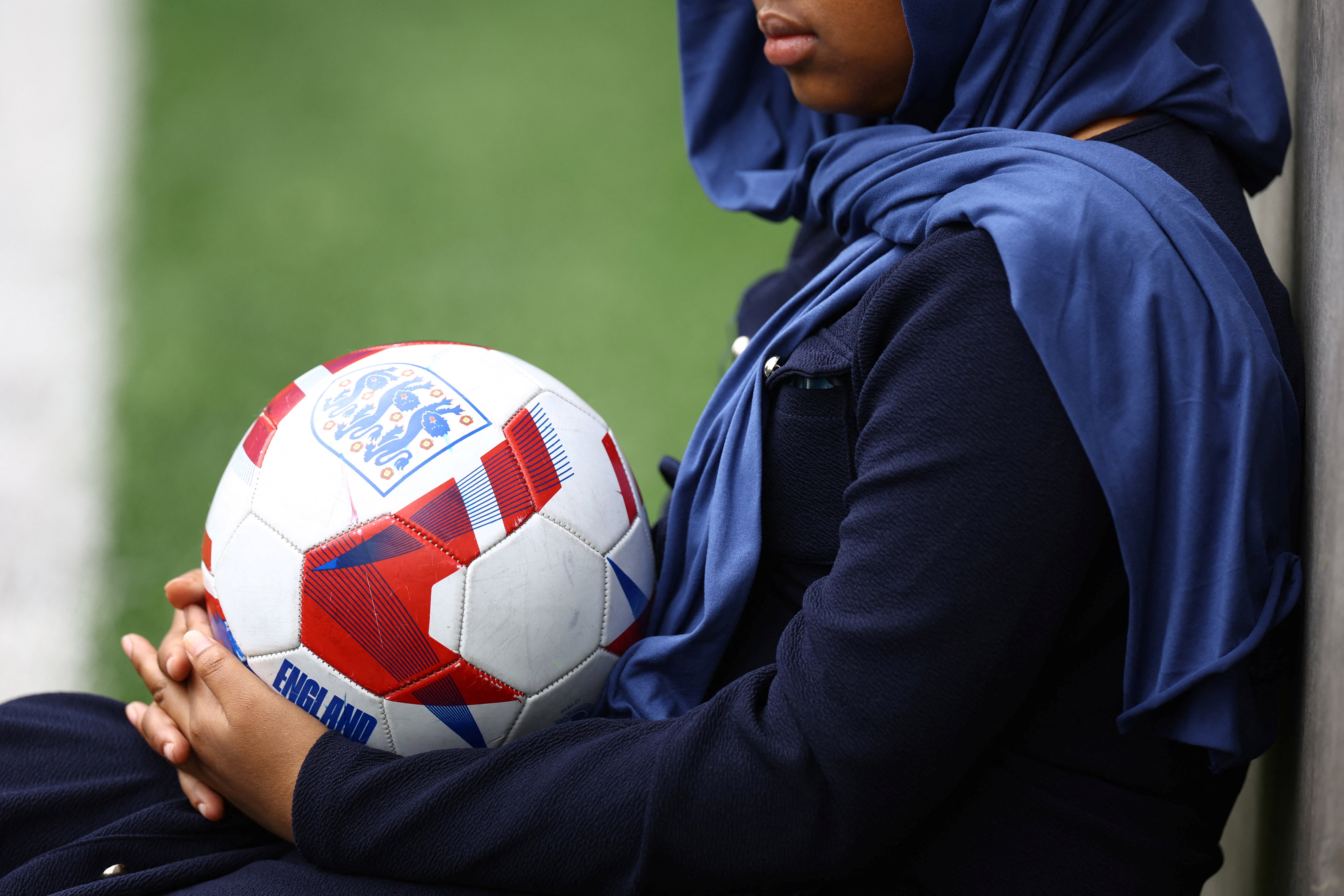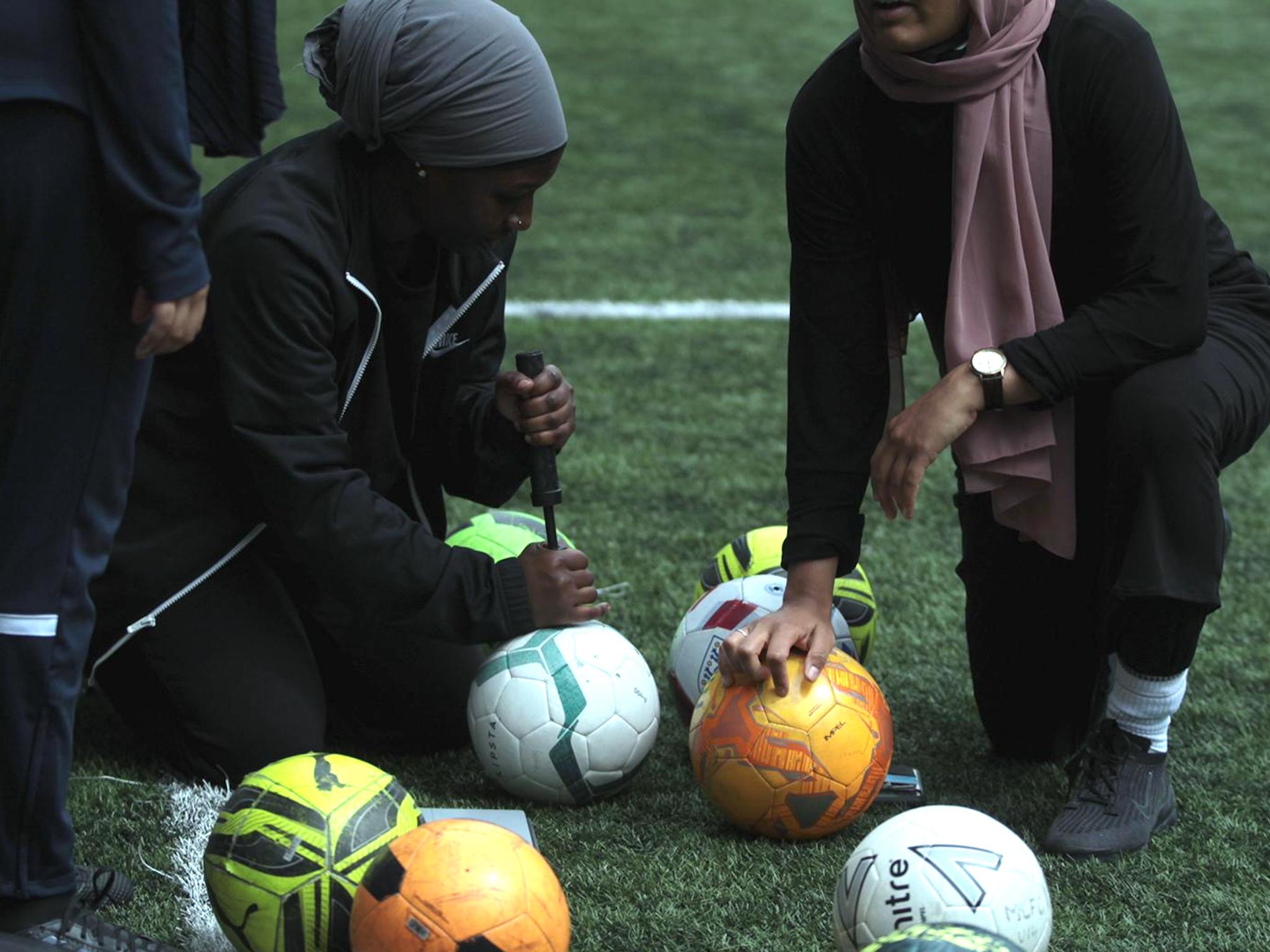‘We’re finally seeing people like us’: Meet the Muslim women changing representation in sport
Conversations about diversity are circling the World Cup. Furvah Shah speaks to the women heading up football teams and running clubs that are providing safe spaces for Muslim women to play sport


Your support helps us to tell the story
From reproductive rights to climate change to Big Tech, The Independent is on the ground when the story is developing. Whether it's investigating the financials of Elon Musk's pro-Trump PAC or producing our latest documentary, 'The A Word', which shines a light on the American women fighting for reproductive rights, we know how important it is to parse out the facts from the messaging.
At such a critical moment in US history, we need reporters on the ground. Your donation allows us to keep sending journalists to speak to both sides of the story.
The Independent is trusted by Americans across the entire political spectrum. And unlike many other quality news outlets, we choose not to lock Americans out of our reporting and analysis with paywalls. We believe quality journalism should be available to everyone, paid for by those who can afford it.
Your support makes all the difference.When Saudi Arabia won against Argentina in the World Cup last month, players celebrated by prostrating on the pitch. In Islam, prostration is performed in prayer to give thanks to God. For football fan Fathiya Saleh, it was the first time she felt represented on a global stage as a Muslim sportswoman.
“We’re finally seeing people like us and communities like ours making big moves in sport for others around the world to see and it’s inspiring,” says Saleh, who is also the co-founder of Sisterhood FC. The south London-based squad is the UK’s first football team created solely for Muslim women, founded with the hopes of increasing participation and diversity in the sport. According to a recent survey by Muslimah Sports Association and Muslim Census, almost one-third of Muslim women in Britain say they don’t partake in sports or other fitness activities regularly, while a further 33 per cent say their past experiences have negatively impacted their participation in sports.
Conversations about representation in football have begun again since the World Cup kicked off in Qatar last month. As the first major sporting tournament to be held in a Muslim-majority country, and with ethnically and religiously diverse teams like Morocco and Senegal showcasing their skills to the world, the event is also highlighting a push for better representation in sports. With the tournament underway and the recent victory of the England women’s football team at the Euros this year, many Muslim sportswomen feel that now is their chance to finally be seen, heard and respected in sports such as football, running and more.
“Our team struggled to be taken seriously for a long time by other teams, coaches, and sponsors,” says Saleh. “This feels like an exciting time that will make a difference for sports groups like ours and the women who play for us.” Saleh set up Sisterhood FC in 2018 after feeling uncomfortable and excluded from previous sports teams she’d been a part of. “Any team I wanted to join was predominantly white and I felt there wasn’t really a place for women who looked like me or wanted to wear trousers or long sleeves,” she says. For many practicing Muslim women, dressing modestly is an important part of their faith and something that has wrongly been proven to be a barrier to sport.
Four years on, the team has grown rapidly. Sisterhood FC now have more than 100 regular players who vary in ability from beginner to advanced. The squad have competed in local tournaments and collaborated with high-profile brands such as Adidas, Nike, and Puma. And yet despite these successes, the team still faces discrimination on and off the pitch.
Saleh recalls one comment that a stranger left on an Instagram post about Sisterhood FC. Their words stuck with her. “They wrote, ‘You should wear what football permits you to wear, which is shorts and a T-shirt and if you don’t want to wear that, you shouldn’t be playing.’” The team also struggles to access consistent places to play other than parks and university grounds. Likewise, it is tricky for them to find coaches. Two problems, she says, which demonstrate the need for better funding for grassroots sports teams like Sisterhood FC.

Fatima Musa, running coordinator at Asra running club, is also calling for better, tangible support for female, Muslim sports teams. Asra club began in 2019 with similar hopes of being a safe space for Muslim women to exercise and build community. Since then, the group has welcomed more than 200 people at their weekly runs, a number that shows the huge demand for spaces like theirs. “Many participants have said that they had always wanted to run and now they have a space to do so,” says Musa. “People often bring their sisters, mums, or friends along, which is a testament to how comfortable and safe they feel. Some have had negative experiences in the past, like feeling they’re too different or the odd one out because they wore the hijab.”
While the World Cup and the attention given to the Women’s Euros have been celebrated as landmarks for representation, Musa is careful not to overstate their importance. “This is about more than representation, it’s about addressing what the real barriers are for people,” she says. “Groups like Asra club have worked to address those barriers, but we also need funding and brands to look at Muslim women in a more holistic way and not just reduce us to a hijab, for example. Visibility is important, but we need grassroots-level support.”
This push for better support needs to begin at a young age, says long-time footballer and sports fan Sara Taleghani. “Growing up, I definitely felt unsupported. Even though I was quite athletic, I wasn’t encouraged by my peers or teachers to play because they viewed my hijab as a health hazard,” she says. The hijab – a head covering worn by many practicing Muslim women – was banned, along with other head covers, by Fifa until 2012. The reason they gave was that it supposedly posed too great a risk of injury to the head or neck. After years of campaigning, the ban was officially lifted in 2014.
I would be told to take my hijab off or tie it a different way, so I just stopped going
“I would be told to take my hijab off or tie it a different way, so I just stopped going,” says Taleghani. “Even though I always wanted to get involved in sports, it wasn’t a space I was comfortable in.” After discovering teams like Sisterhood FC and Asra club, Taleghani says she now feels more confident in playing sports. “I don’t have to worry about finding a kit that is modest enough or being able to pray. I’m made to feel comfortable; I can enjoy being active and not have to worry about being judged.”
Yashmin Harun BEM, chair and founder of Muslimah Sports Association – a charity established in 2014 that facilitates Muslim women to play, volunteer and coach in a variety of sports – says conversations about representation in sport still have a long way to go. “We want Muslim females participating in sports to be part of the ordinary and not to be the extraordinary. This needs the support of our communities and allies, but also the media and those telling our stories,” she says.
Harun says the World Cup is just the beginning of conversations regarding diversity and inclusivity in sports. “It has been inspiring to see many more females at the games in Qatar, especially from the African countries – and this may be due to where the World Cup is held and the alcohol ban. Regardless, more Muslim females are starting to love sports and, more importantly, play and coach,” she says. “This can only be a good thing.”
Sisterhood FC’s Saleh has high hopes for the future. “To see how far women have come compared to 10 or 20 years ago, it gives us hope that Muslim women could one day play at a professional level,” she says. “We might see a hijabi, Muslim woman playing in the women’s Premier League or World Cup one day.”



Join our commenting forum
Join thought-provoking conversations, follow other Independent readers and see their replies
Comments